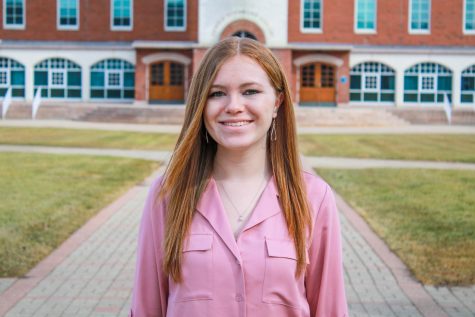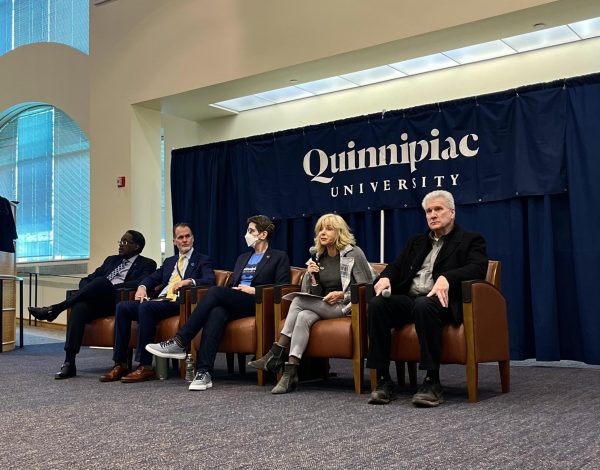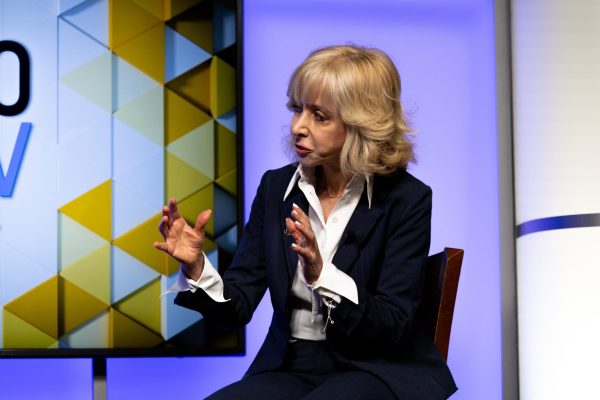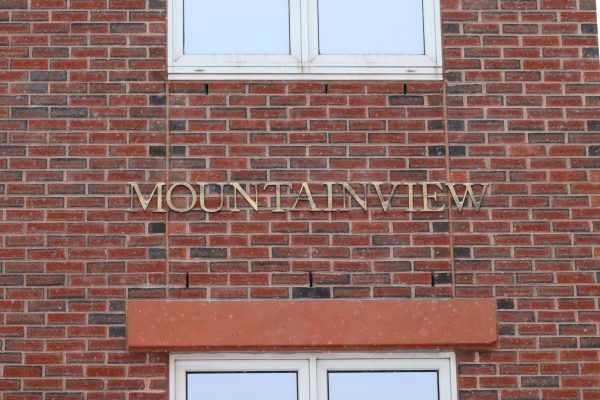Exclusive Interview with President Olian
President Olian had a conversation with Q30 surrounding topics, such as the strategic plan, transparency, budget cuts and more
Follow @q30news Follow @brooke1097
Quinnipiac University President Judy Olian sat down with Q30 News for an exclusive interview on Tuesday evening.
The beginning of the discussion centered around what she thinks the job of a modern university president is.
“We need to be looking at the future and what that looks like in terms of both job demands, but also people[’s] needs, the educational needs of the individuals,” Olian said.
She said that her role is to focus on the needs of the students and their futures. She needs to keep up with the times and how jobs change.
“As the university of the future, which of course is what we talk about at Quinnipiac, we need to be thinking about the skillset, but also the learners and how we meet with their needs,” Olian said.

Many universities fundraise to help meet the needs of the students.
“You have to make a very compelling case of need,” Olian said. “Our donors have to believe in us, that they can trust us with their hard earned dollars that we will in fact make a difference.”
At Olian’s inauguration ceremony in May 2019, she announced that Chairman of the Board of Trustees William Weldon donated $15 million to the university. This is being used for several different priorities, including the Weldon Chair, an Oxford program partnership surrounding rehabilitative medicine, student scholarships and the trustee house, which is the ongoing house for the university president.
“As time goes on, their contributions will change to other priorities depending on the needs of the university and what their passions are,” Olian said.

Olian announced last year that she would be working on a five-year strategic plan.
“When you develop a strategic plan, you think longer term. You don’t think just about the immediacy of what’s tomorrow,” Olian said. “With student input, with faculty input, with staff and stakeholders, like the trustees and alumni, we developed the strategic plan around four pillars.”
The four pillars are the mindset for the 21st century, inclusive excellence, well-being and lifelong learning. The university has begun working on projects involving each pillar. Some examples include, digital courses in each student’s experience, bringing in more diverse students through the partnership with Gateway and Housatonic Community Colleges and the New Haven Promise scholarship, a new wellness center and partnerships with companies in Connecticut to instill lifelong learning.

The university made budget cuts that total to over $3 million due to a decrease in student enrollment for the 2019-2020 academic year.
“We need to think about what the right size of Quinnipiac University is going towards the future,” Olian said. “The main issue is to be distinctive and excellent at what we do so that students choose us as their first choice institution.”
Olian said that the strategic plan is making way for the university to stand out in the future.
Olian said that the budget cuts are not directly impacting students and explained how nothing has changed in terms of what is being invested in for them. She discussed how funding is now going to things, such as club sports, free laundry next academic year and facilities improvements across all three campuses.
Since there are fewer students on campus, there is not a need for so many faculty members to teach multiple sections of each course according to Olian.
“We’ve asked every one of the schools to look at what they’re doing in terms of what is not essential for the future of the campus,” Olian said.

Olian held a town hall style meeting with faculty and staff members on Nov. 4 and is planning to hold one with students on Dec. 3.
“We want to have an open conversation, and we don’t go in with any agenda,” Olian said. “We open the floor up to any questions that come up, and with the key members of the senior management team there, I think we can provide the best answers, the most knowledgeable answers to anything that comes up.”
Sometimes questions arise regarding “difficult issues,” according to Olian, but she sees it as an honest conversation that needs to be had and hopes that is what happens during the student town hall meeting. Olian hosted an informal town hall for students in February 2019.
“We are open to addressing any questions that come from the students,” Olian said. “I don’t necessarily have to have any prepared statements in advance. I’d like to maximize the time however the students want to use it.”
Last semester, Olian shared that she would like to be more transparent with the university community. The strategic plan helps provide some clarity as to what the university is working on, and she continues to hold office hours and follow up on conversations she has had.
“I hear, I listen, and I find lots of great ideas from those open conversations,” Olian said.

The university and the Town of Hamden have a history of tension with each other. The most recent issue was over the application for the university president’s property, located at 305 Spruce Bank Road, being changed from residential use to university use.

“Vice President Bethany Zemba has been spending a lot of her time on that,” Olian said. “There has been a tremendous outreach from the university, and I think overtime, we’ll see improvement, and we’re already seeing improvement in the relationships.”
Zemba has worked to establish a partnership committee with Hamden residents and faculty and staff at Quinnipiac. The purpose of this is to have ongoing conversations about tension and issues between the university and the town and how these can be improved.
“The students, faculty and staff are engaged in many, many initiatives and partnerships with the community from being involved in schools, to the service day, to preparing tax returns,” Olian said. “We don’t publicize that enough.”
The university is creating a website to share community events that students, staff and faculty are engaging in.
“This doesn’t happen overnight. It’s a process,” Olian said.” But, more and more, I think the town is seeing outreach, and we are certainly keen to partner around the priorities of the township.”

Some students are frustrated with the counseling services at the university, saying that there is limited availability and long wait times to see a counselor. There has been a large increase in the amount of students using counseling services this academic year compared to last.
“We’ve increased the number of counselors, and we continue to increase the number of counselors who are available,” Olian said. “And of course, the wait times are shortened dramatically if there’s an urgent case because we triage cases immediately.”
Despite getting more counselors, Olian thinks that the new health and wellness center will help with this issue.
“The investment in the wellness center will include a very important priority investment in spaces and services for counseling,” Olian said. “But, I also think that we have to create a healthy foundation for life.”
Olian would also like to have health and wellness programs that address prominent issues students face.

Each school in the university is creating its own strategic plan specifically for its programming.
“We’re going to be really planning our enrollment outlook for next year with some new data, with our new vice president,” Olian said. “From that, the budget model and how we hire and grow and build will be determined.”
Stay with Q30 News as we continue to follow Olian and the university’s initiatives and plans for the future.

Brooke Reilly is a senior journalism major from Cornwall, NY. She is currently the News Director for Q30 TV. She has previously served in the roles of Executive Producer of the Q30 Newscast, Associate Producer of #THAT and Secretary of Q30 TV. Brooke is currently an intern at NBC News in New York City with the TODAY Show. She previously interned at KTLA 5 News and the FOX News Channel in Los Angeles...






